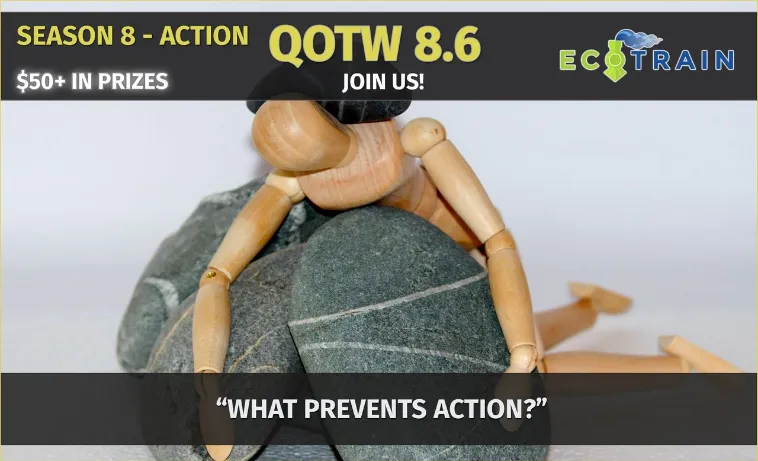It has been quite some time since I last posted a response to EcoTrain's Question of the Week. My absence, or apparent inactivity, has its reasons which I don't mind discussing, though at the same time I never thought it would be interesting enough to relate in great details. However, since this week's question wants to know precisely what prevents action, I thought I might as well do that.
Lost in Prioritizing
I would say one of the most common reasons why real change does not happen, that is why people don't do something, is because they are busy doing something else. This could be pulling children from burning buildings, or it could be scrolling on social media. It doesn't matter what activity it is, and even less whether others perceive it as useful, important, and productive, or just a stupid waste of time. The individual has decided to spend their time doing that (whatever it may be) instead of ... well, something else, where action may also be needed. It's their choice, with their own reasons behind it, even if it's nothing more than "feeding an addiction" or "forgetting about the world". So no matter the reason, it all comes down to prioritizing, which people then call (not) having time, as if time had anything to do with it.

In my case, one of the main reasons for not posting in the last couple of QOTWs, that is for placing something else on a higher priority, is the crowdfunding campaign for the theater group I am involved with. (BTW, it's going decently well, though not as well as we had hoped... but I'm not here to discuss that now.) Had things gone differently, I may be just returning from an Earthship build in Portugal, in which case that would have been the reason for not posting QOTWs. But as common as prioritizing is to prevent action, it is by no means the only reason.
Various Levels of Discouragement
So let's consider the action in question. How hard would it be to actually do it? Would it take a lot of work, time, effort, or money? Would it be unpleasant, maybe even painful? All of these can be compelling reasons NOT to do it, especially if the costs outweigh the rewards. But even for something truly worthwhile, something you'd be willing to make a sacrifice for, there can be other forms of discouragement. Could you get in trouble for your action, maybe even be arrested, beaten, sentenced to imprisonment? Would it end up costing you a lot, maybe even more than what you have? Then there is the question of who would support you? Would you be facing adversities as part of a large mass, or would you be standing alone, like tank-man in Tianamen Square in 1989?

image source
What's the Point, Anyway? (If There Is One At All...)
But okay, let's say you are determined to act, and made it your top priority, even in spite of severe discouragement. There is yet one more thing that could seriously sabotage your efforts, which doesn't even have to come from outside. It's a little thing called doubt... When you start wondering if there's a use in acting at all. If you build something only to see it getting destroyed immediately upon completion. Or if you realize only after having put in a great deal of effort, that the result you had been hoping for is not related to your actions. Or if some new set of factors emerge that alter the whole game. What do you do when facing futility? Are you going to blindly proceed, stubbornly refusing to let go of what you'd been holding on to for so long? Or will you surrender your approach, maybe throw in the towel entirely?
Preventing the Prevention of Action
To fully exhaust this question, I would like to look at it from the other side: Let's say some people want some action you don't like. How can you prevent them from acting? Looking at the above, it should be simple: If nothing else, you need to convince them that it's not really necessary, and that there are many other more important or interesting things to spend your time on. Depending on the issue, this may be the most cost effective way, and if done well, it can dissipate action completely. Otherwise, if the actors really want to act, you may have to apply some form of discouragement: dig up some laws making their action punishable, causing division among them, so they may discourage each other from acting, and if all else fails, openly vilify them and their action. At this point, however, sowing doubt is most likely going to be among the techniques implemented to discourage action.
Swinging the viewpoint back to those wanting to act, its important to realize that one of the major reasons for preventing action just may be all those who have a range of tools at their disposal in order to do just that. This is probably not so much the case with such benign things a me answering to QOTWs, but a lot more when it comes to bringing about lasting social change, or tackling such multi-faceted problems as the climate emergency. For this reason it is vitally important to maintain the right approach for action, especially regarding huge issues. It's not enough to be wanting it, one has to be aware of what's at stake, but even more so that it may not work. Even once all these things have been made clear, it's not a guarantee for success, though it is certainly a prerequisite.

